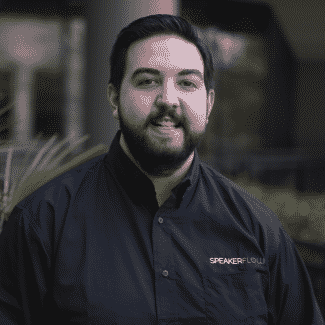Taylorr Payne with SpeakerFlow joins us on this episode to share how speakers can streamline consistency in booking gigs.
The harsh reality of running a business is that it’s often 90% of the work that yields 10% of the fun time that we get to spend doing what we love.¬† His business, SpeakerFlow, helps experts build better businesses so they can spend time doing the the fun things – like speaking from stage. SpeakerFlow focuses on three aspects of business:
– THE TECHNOLOGY – THE STRATEGY –
– THE COMMUNITY –
Taylorr and his team bridge the gap between sales and marketing, providing the technology and education necessary to scale your business.
On this edition of The Speaker Lab, Taylorr and I talk about the main challenges speakers run into: knowing when to standardize the processes in place and the consistent scalability of follow-up.
Questions every speaker should ask themselves before reading further:
- Am I willing to learn to run the business?
- Do I understand that having the business component allows me to scale and do more of what I love?
- Am I willing to take on the challenge?
Once a speaker decides that they want speaking to me more than a side hustle, it’s time to standardize and implement processes. Once this is put into place, the focus can become consistently scaling the business.
“We can only maintain 150 relationships in our lifetime with 5 in our inner circle.
When running a business you’re expected to make it seem like you can manage thousands of relationships at any given time.
So the only real solution is technology.”
Leveraging technology is imperative in order to stay afloat, helping you stay consistent. Taylorr drives home the importance of defining processes, utilizing a CRM that manages your follow-up tasks and helps maintain your calendar and setting up systems.
3 MUST HAVE Systems for Speakers:
- Prospecting tool
- CRM (Client/Customer Relationship Management) tool
- Calendar tool
Keep in mind that the process doesn’t have to and likely will not be perfect at the start. You have to build it initially, make it better, iterate on it and improve it and be okay with that process. Once systems are established, begin identifying your pain points (any time you think, “I want to fix this,” or recognize friction). Pain points allow you to improve.
It’s important that you indicate that there’s a pain first and fix it with a system rather than over-engineer a manual solution.
The four big, big pain points to all of our lives and as an entrepreneur, our businesses are:
Time. Energy. Money. Stress.
Technology is meant to assist in those pain points.
Assisting: an act of helping, doesn’t mean that technology takes the place of human interaction, which most people are afraid of.
Technology and the systems it creates makes your human interaction easier to maintain in reality. Taylorr shares this acronym about systems:
S-save
Y-yourself
S-some
T-time
E-energy
M-money
S-stress
Hear Taylorr dive into topics and more when you listen to episode 329 of The Speaker Lab!
THE FINER DETAILS OF THIS SHOW:
- What are the most important systems you need as a speaker?
- Who can sell you better than you?
- How do you find the balance between technology and humanity?
- Why do so many prospecting efforts fail?
- What should be automated and what should be personalized in your sales process?
- Why you shouldn’t solely rely on outsourcing.
- What are the approaches working best during the pandemic?
- And so much more!


